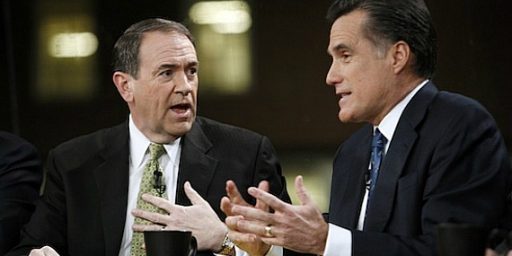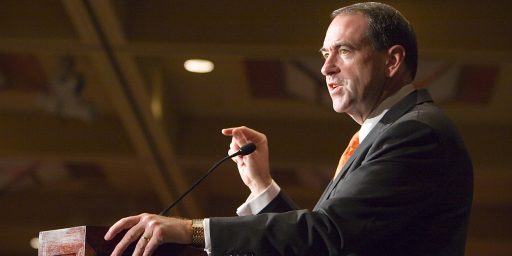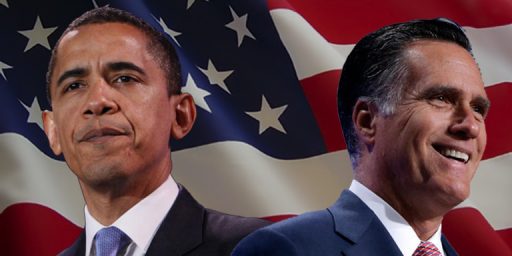Iowa Shake-Up: Huckabee and Obama Take Lead
The bizarre drama that is the Iowa caucuses has taken another interesting turn, with Mike Huckabee and Barack Obama suddenly leading the polls, displacing long time front runners Mitt Romney and Hillary Clinton, respectively.
Des Moines Register staff writer Jonathan Roos discusses the Republican half of the paper’s latest survey:
Mike Huckabee has leaped ahead of Republican presidential rival Mitt Romney in Iowa, seizing first place in a new Des Moines Register poll of likely Republican caucus participants.
Huckabee wins the support of 29 percent of Iowans who say they definitely or probably will attend the Republican Party’s caucuses on Jan. 3. That’s a gain of 17 percentage points since the last Iowa Poll was taken in early October, when Huckabee trailed both Romney and Fred Thompson.
Other poll findings indicate that the former Arkansas governor is making the most of a low-budget campaign by tapping into the support of Iowa’s social conservatives.
Romney, who has invested more time and money campaigning in the state than any other GOP candidate, remains in the thick of the Iowa race with the backing of 24 percent of likely caucusgoers. But that’s a drop of 5 points since October for the former Massachusetts governor.
His colleague Thomas Beaumont handles the Democrats:
Barack Obama has pulled ahead in the race for Iowa’s Democratic presidential caucuses, while the party’s national frontrunner Hillary Clinton has slipped to second in the leadoff nominating state, according to The Des Moines Register’s new Iowa Poll.
Despite the movement, the race for 2008’s opening nominating contest remains very competitive about a month before the Jan. 3 caucuses, just over half of likely caucusgoers who favor a candidate saying they could change their minds.
Obama, an Illinois senator, leads for the first time in the Register’s poll as the choice of 28 percent of likely caucusgoers, up from 22 percent in October. Clinton, a New York senator, was the preferred candidate of 25 percent, down from 29 percent in the previous poll.
Former North Carolina Sen. John Edwards, who led in the Register’s May poll, held steady with 23 percent, in third place, but part of the three-way battle.
The lead change appears after weeks of increasing criticism of Clinton by Obama and Edwards about her position on U.S. policy toward Iran and questions of her candor.
We’re close enough to the actual voting that the numbers are meaningful and the pollsters at least attempted to screen for likely voters. Still, caucuses are incredibly difficult to poll given the intense commitment required.
Plus, as Josh Marshall points out, even if you predict who will show up and how they will vote initially, there’s no accounting for horse trading:
Remember too that there’s a significant wildcard factor in the caucus system. It’s not a straight one person one vote. People meet at their caucus locations and candidates with less than I believe 15% of caucus-goers at that caucus have to either switch to another candidate or into an uncommitted group. The key point is that who peoples’ second choice may be can have a powerful effect on the outcome — one not necessarily revealed just by looking at a conventional poll.
In this case, the top two Republicans and the top three Dems each appear well over 15% support. But remember, that’s statewide. In individual caucuses you’re going to have a lot variation. Especially on the Democratic side, the second choice could be key.
More bizarre, as Nicholas Beaudrot points out, the Democrats and Republicans conduct the process quite differently:
Iowa’s Republican caucus, which is really a statewide straw poll, does not use the same procedures as the Democratic caucus. There’s a secret ballot, which determines delegates to County Conventions, which then determine delegates for the State Convention. There’s no 15% threshold as there is in the Democratic caucus. That means it’s not particularly important which candidate is the second choice of McCain, Paul, etc. supporters.
Regardless, while the process is interesting and entertaining, I’m not sure how much it matters.
The conventional wisdom, backed by history, is that Iowa and New Hampshire are crucial contests and that a strong showing in at least one of them is required to mount a credible campaign. I continue to believe that this year’s front loaded schedule makes that much less true.
Traditionally, there was a long breather after New Hampshire, during which the momentum from the two early contests allowed those who did well there to raise large amounts of money while simultaneously making it difficult for their opponents to compete. But this year New Hampshire is followed a week later by Michigan, which is followed four days later by South Carolina and Nevada and then Florida in another ten days. Then, on February 5 — a mere three weeks after New Hampshire — all hell breaks loose with Alabama, Alaska, Arizona, Arkansas, California, Colorado, Connecticut, Delaware, Georgia, Illinois, Minnesota, Missouri, Montana, New Jersey, New York, North Dakota, Oklahoma, Tennessee, Utah, and West Virginia all voting. (This is the Republican schedule; there’s some minor variation on the Democratic side.)
Certainly, Hillary Clinton and Rudy Giuliani have enough money to keep going even if they fail to win Iowa or New Hampshire. For that matter, so do John Edwards, John McCain, and Ron Paul. Why would any of them abandon ship before February 6th?






I sure am glad I publicly called the GOP nomination for Huckabee back in August.
I agree that the extension of campaign season and the compression of the primaries reduce the influence of New Hampshire and, especially, Iowa. I continue to think that it will take something really extraordinary to shake the nomination out of Sen. Clinton’s hands.
I also continue to believe that Mitt Romney is most likely to be the Republican nominee. He fits the profile of a Republican presidential candidate better than Mike Huckabee does.
I am kind of seeing this campaign season not actually having any clear winners over the first few primary/caucus cycles.
I think in the end Hillary pulls out the nomination.
I think the GOP nomination is wide open-I just don’t see a clear winner at this point-I see a few clear losers, but not anyone who is going to take it all.
So only one of us is right then.